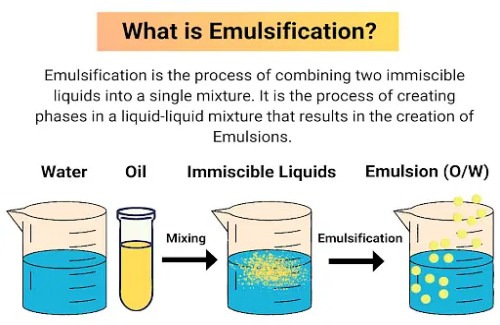10 Ways Why Emulsifier In Food Improves Consistency and Quality
Wiki Article
Uncover the Advantages of Making Use Of an Emulsifier in Food for Boosted Culinary Experiences
Emulsifiers are commonly neglected yet vital parts in cooking techniques. They assist in the mixing of disparate active ingredients, improving both flavor and appearance. By ensuring security, emulsifiers avoid the undesirable splitting up of mixes. Their adaptability extends various applications, from sauces to dressings. Comprehending their function can bring about significant renovations in food top quality and discussion. What details benefits do emulsifiers provide that can change daily recipes into remarkable cooking experiences?Understanding Emulsifiers: What They Are and Exactly how They Work
Emulsifiers play a necessary role in the food industry, serving as representatives that assist in the mixing of water and oil, 2 compounds that commonly do not mix. These substances have both hydrophilic (water-attracting) and hydrophobic (oil-attracting) properties, permitting them to maintain blends by lowering the surface tension in between the two phases. Usual emulsifiers consist of lecithin, mono- and diglycerides, and particular proteins.When included in food, emulsifiers produce a stable emulsion, protecting against separation and making sure a consistent texture - Emulsifier In Food. They are crucial in numerous applications, ranging from salad dressings and mayonnaise to ice lotion and sauces. By maintaining the stability of combinations, emulsifiers not only boost the visual charm of food yet likewise enhance mouthfeel and consistency. Their capability to maintain solutions makes them crucial in modern food formulation, adding significantly to the quality and service life of numerous items
The Role of Emulsifiers in Flavor Improvement
While frequently neglected, emulsifiers significantly add to taste enhancement in foodstuff. They play a vital role in improving the general preference experience by assuring that taste substances are uniformly distributed throughout a recipe. By supporting solutions, such as dressings or sauces, emulsifiers protect against the splitting up of oil and water, enabling tastes to meld together better. This consistent distribution not just escalates the taste but likewise assures that each bite is continually delicious.Additionally, emulsifiers can improve the perception of certain flavors, making them extra obvious on the taste. They might communicate with specific ingredients, assisting to launch unstable taste substances that contribute to a recipe's fragrant profile. The use of emulsifiers can substantially elevate the cooking experience, transforming simple recipes into complicated and delightful flavor trips. Their refined yet impactful function in flavor enhancement ought to not be undervalued in the art of food preparation.
Emulsifiers and Structure: Developing Creamy and Velvety Dishes
The influence of emulsifiers prolongs past taste improvement to the domain name of appearance, where they contribute in producing silky and luscious recipes. By helping with the uniform circulation of fats and water, emulsifiers enable the development of steady solutions, leading to an extravagant mouthfeel. This is especially apparent in products my sources like mayo, sauces, and dressings, where a smooth, velvety consistency is preferred.Emulsifiers such as lecithin and mono- and diglycerides function to decrease surface stress between active ingredients, permitting a harmonious blend that boosts the sensory experience. The creamy appearance attained via emulsification can boost recipes, making them more appealing and delightful. Additionally, the capability to develop a creamy appearance allows chefs to include different active ingredients without endangering uniformity, leading to ingenious culinary creations. Basically, emulsifiers play a necessary function in transforming ordinary recipes right into extraordinary cooking experiences through structure enhancement.
Stability Matters: Exactly How Emulsifiers Prevent Splitting Up
A crucial facet of cooking emulsifiers is their ability to avoid separation, guaranteeing that items maintain their designated appearance and appearance over time. Emulsifiers function by stabilizing mixes of oil and water, which naturally have a tendency to divide as a result of differences in thickness and polarity. By decreasing surface area stress at the oil-water user interface, emulsifiers help with the development of steady emulsions, enabling a consistent distribution of ingredients.
Typical Emulsifiers in Cooking and Their Applications
Recognizing the numerous emulsifiers typically used in food preparation exposes their substantial functions in boosting food appearance and stability. Lecithin, stemmed from egg yolks or soybeans, is extensively employed read what he said in mayonnaise and salad dressings, supplying a velvety uniformity. Mustard, also an emulsifier, aids in stabilizing vinaigrettes while conveying taste.

An additional popular emulsifier is xanthan periodontal, frequently utilized in gluten-free baking and sauces for its thickening homes. Guar gum serves a comparable function, enhancing the texture of ice lotions and dairy products.
Mono- and diglycerides, often found in refined foods, help boost life span and keep structure. Casein, a milk healthy protein, is used in cheese-making and velvety sauces, adding to a smooth mouthfeel. Each of these emulsifiers plays a crucial visit our website duty in culinary applications, making sure desirable appearances and preventing splitting up in diverse food items.
Regularly Asked Inquiries
Are Emulsifiers Safe for Individuals With Food Allergies?
Emulsifiers can be risk-free for people with food allergic reactions, depending upon the particular emulsifier utilized. It is essential to recognize the source of the emulsifier, as some may trigger allergic reactions in sensitive individuals.
How Do Emulsifiers Impact the Nutritional Content of Food?
Emulsifiers can affect the dietary material of food by improving nutrient absorption and improving texture. Their visibility may additionally dilute certain nutrients, depending on the food matrix, possibly modifying overall nutritional value.Can Emulsifiers Be Made Use Of in Vegan Cooking?
Emulsifiers can be efficiently utilized in vegan cooking, offering structure and security to dishes. Plant-based emulsifiers like lecithin, originated from soy or sunflower, aid mix active ingredients, boosting the general high quality of vegan cooking productions.What Are the Environmental Impacts of Emulsifier Production?
The ecological effects of emulsifier manufacturing frequently consist of logging, water pollution, and high energy consumption. In addition, some resources of emulsifiers can contribute to biodiversity loss, increasing issues regarding sustainability in food production practices.How Do Emulsifiers Contrast to Natural Thickeners in Food Preparation?
Emulsifiers supply smoother appearances and enhanced stability compared to all-natural thickeners, which can pass on distinct tastes - Emulsifier In Food. While emulsifiers boost mouthfeel and appearance, natural thickeners give even more health and wellness advantages and can add to the recipe's taste profileWhen included to food products, emulsifiers produce a secure solution, preventing splitting up and guaranteeing an uniform texture. While usually ignored, emulsifiers considerably add to flavor enhancement in food products. Understanding the numerous emulsifiers generally utilized in cooking exposes their considerable functions in improving food appearance and stability. Emulsifiers can be secure for people with food allergic reactions, depending on the details emulsifier utilized. Emulsifiers can affect the dietary web content of food by enhancing vitamins and mineral absorption and boosting appearance.
Report this wiki page